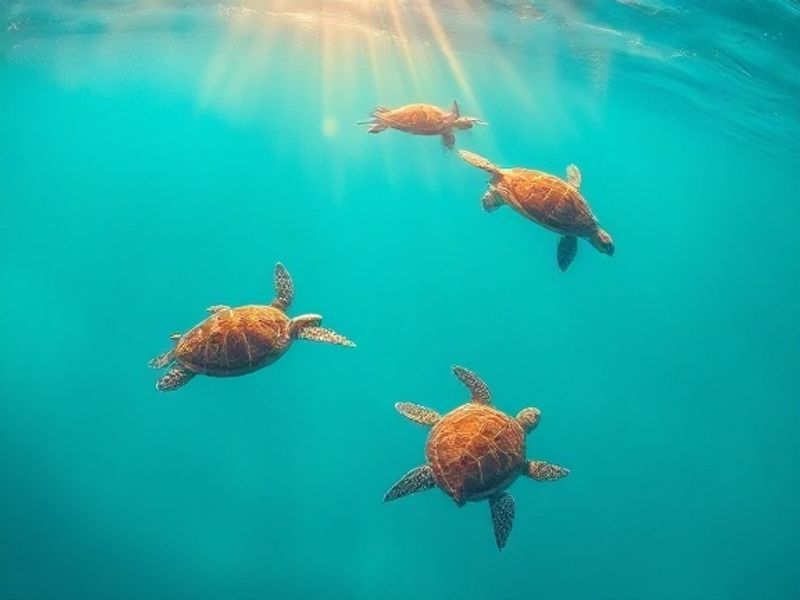Shell Game: How Turtles Are Quietly Outlasting Nations, Markets, and the 24-Hour News Cycle
The Turtles: A Slow-Motion Global Rebellion Against the Speed of Collapse
By A. Correspondent, filing from a beach bar that used to be a nesting site
The turtles—those obstinate, algae-covered anachronisms—have quietly declared war on the 21st century. From the Gulf of Oman to the Gulf of Mexico, from the Andaman Islands to the Andalusian coast, they are flipping the bird at every human timetable, every quarterly earnings report, every “disruption” slide deck. Their weapon is simple: they refuse to die on schedule.
Consider the numbers. Loggerheads born in the 1980s are now returning to lay eggs on beaches that have since been rebranded as “eco-resorts” where breakfast Wi-Fi passwords are longer than most national constitutions. Hawksbills tagged in the Carter era are still cruising Cuban reefs, dodging cruise ships named after Scandinavian gods. Somewhere off Queensland, a green turtle first flipper-tagged during the Falklands War just celebrated her own Falklands War—against plastic shopping bags. The turtles, in short, are outliving the empires that named them.
The international implications are deliciously awkward. The Chinese government, which can relocate a million people for a dam before lunch, finds itself negotiating with a reptile that needs exactly the same strip of sand its grandparents used in 1953. In Kenya, rangers armed with drones and thermal imaging now play crossing guards for 150-kilogram septuagenarians who couldn’t care less about sovereign maritime boundaries. Meanwhile, the EU—an institution that can’t agree on breakfast cheese—has unanimously adopted turtle-excluder devices because Brussels discovered that dead turtles photograph poorly on Instagram.
It’s geopolitics at 0.2 kilometers per hour. Japan still harvests a quota of sea turtles “for traditional research,” which looks suspiciously like soup, while Australia threatens WTO action over “unsustainable cultural appetites.” The irony: both nations are seeing record numbers of turtles anyway, because climate change shifted currents and the turtles simply rerouted—like frequent flyers switching terminals. The planet rewrote its own boarding pass, and no frequent-flyer lounge could stop them.
Then there is the money. Ecotourism operators now earn more from a single nesting beach than the entire fishing fleet that used to net turtles for export. Coastal villages from Suriname to Sri Lanka have pivoted from harvesting eggs to guarding them, which pays better and involves significantly fewer machetes. The World Bank has financed “turtle bonds,” a financial instrument whose coupon payments depend on how many hatchlings scuttle safely into the surf. Yes, we have securitized reptiles. If that doesn’t make you question late-stage capitalism, perhaps the fact that Goldman Sachs now employs a full-time herpetologist will.
Still, the turtles remain gloriously unimpressed. They continue to commute across oceans using magnetic fields older than human debt, pausing only to snack on jellyfish that look eerily like single-use plastic bags—an evolutionary prank that keeps veterinarians gainfully employed. Satellite trackers show them crossing pirate-infested waters, oil-exploration zones, naval firing ranges, and still arriving at the precise beach where a hatchling once dug out, greeted by a sandcastle shaped like Elon Musk’s ego.
Meanwhile, humans race around trying to “save” them with apps, hashtags, and biodegradable straws. The turtles accept our frantic assistance the way aristocrats tolerate an over-eager waiter: a polite nod, then back to the business of being ancient. Their real trick is persistence, not heroism. They simply out-wait us, the way a glacier out-waits a ski resort.
So the next time you see a headline proclaiming “World Unites to Rescue Endangered Turtles,” remember the subtext: the turtles are actually rescuing us—from the embarrassment of living on a planet we ruined too quickly. They offer a masterclass in passive resistance: keep showing up, keep laying eggs, and let the Anthropocene exhaust itself trying to keep pace.
In the end, the turtles may be the only witnesses left to close the final chapter of human history, blinking up at whatever replaces us with the same expression they wore when dinosaurs checked out: mild surprise, then a slow return to the sea.







